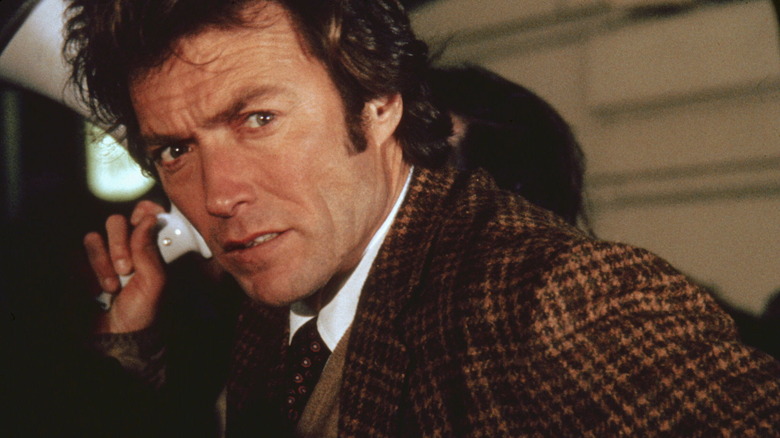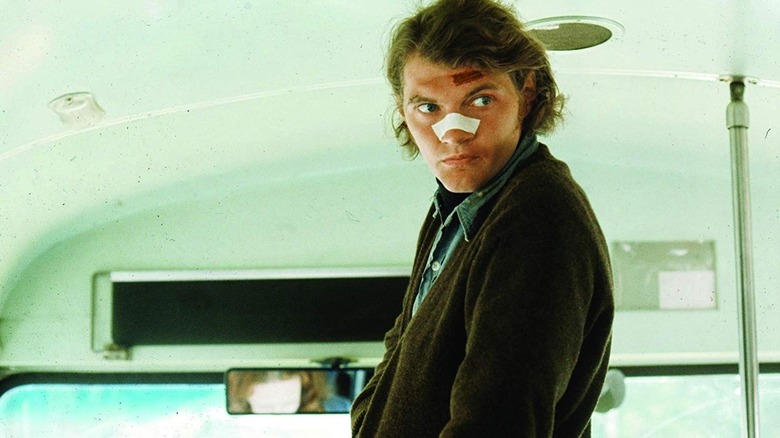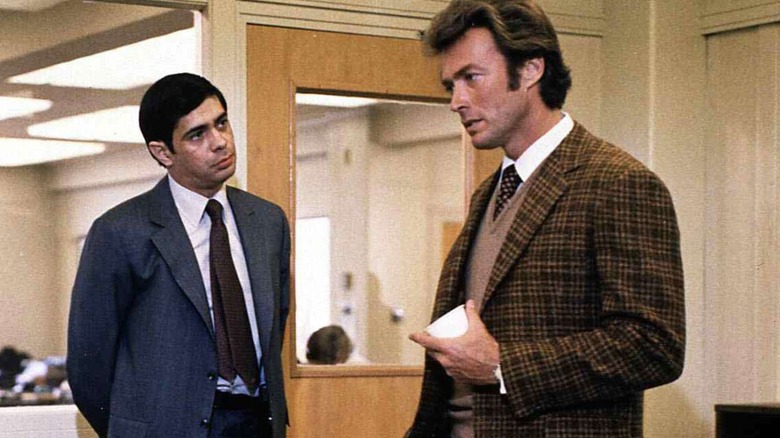Clint Eastwood Had One Demand Before Playing Dirty Harry
Marc Eliot's 2009 biography "American Rebel: The Life of Clint Eastwood" lays out the production of Don Siegel's 1971 cop drama "Dirty Harry" as a complicated affair. The first version of the film's script was violent and raw, telling the story of a cop who has to break the law in order to stop a dangerous serial killer. As the script was passed around, though, many became wary of its violence, and many actors expressed interest and dropped out. The rights to the film were once in the hands of ABC who aimed to adapt it for TV, but sold it to Warner Bros. when they realized just how violent the film had to be. Irvin Kershner was once hired to direct, with Frank Sinatra starring. Sydney Pollock, George C. Scott, Robert Mitchum, Steve McQueen, and many other famous people brushed up against "Dirty Harry" during pre-production. Even Terrence Malick purportedly wrote a draft.
Eastwood was finally approached in 1969, while he was wrapping production on "Play Misty for Me," and he agreed to play the part. Thanks to several years of playing Hot Potato with the script, however, Eastwood was handed several drafts in a pile. The final film was, as one might see, a lot more in tune with the first draft listed above. It was about a cop, Harry Callahan, who was stymied by recently implemented Miranda laws and was unable to apprehend a Zodiac-like killer on a series of technicalities. Harry would eventually be pushed to take matters into his own hands.
According to an interview with Patrick McGilligan, printed in the 1999 book "Clint Eastwood: Interviews" edited by Robert E. Kapsis and Kathie Coblentz, Eastwood was the one responsible for restoring the script to its original simplicity and for hiring Siegel to direct.
He did a good job on 'The Beguiled'
Eastwood has worked with Siegel more than any other director. Prior to "Dirty Harry," the two worked together on the 1968 film "Coogan's Bluff," 1970's "Two Mules for Sister Sara," and the 1971 drama "The Beguiled." In 1979, the two would reunite for "Escape from Alcatraz." McGillian, in his interview with Eastwood, pointed out that "Dirty Harry" was probably the director's best film. Eastwood had a slightly different take but agreed that Siegel was the kind of person he would have liked to see in the director's chair for a gritty cop drama. Eastwood was the one who got the director attached. He said:
"I thought he did a nice job with 'The Beguiled.' Of course, I was the one who hired him for 'Dirty Harry.' When I came over [to Warner Bros.], it was tied into somebody else and the script was going in another direction. I got Siegel involved. My agreement with Warner Bros. was, 'I'll do it if you'll let me hire a director like Don Siegel and we'll take the story back to its original concept' — which was Harry Julian Fink's screenplay. They had taken it off in another direction."
So Eastwood's demand was simple: simplify. Go back to basics, get a pragmatic director, and "Dirty Harry" can move forward. According to a 2008 interview with MTV, Eastwood expanded further, pointing to how wild "Dirty Harry" had become before he stepped in to parse it down. Evidently, there were snipers a-plenty, the military became involved, and the film had become more action-centric.
The later drafts
In the MTV interview, Eastwood recalled hearing about the "Dirty Harry" project when Frank Sinatra had been attached. He remembers being offered the part specifically because Sintra had "a problem with his hand" and had trouble holding a gun. Eastwood didn't quite believe it but took the role nonetheless. When asked about what the studio had changed by the time he was handed a script, Eastwood said this:
"Everything. They had marine snipers coming on in the end, and I said, 'No. This is losing the point of the whole story, of the guy chasing the killer down. It's becoming an extravaganza that's losing its character."
There may be a high-octane version of "Dirty Harry" in a parallel universe somewhere, but it is likely very different from the terse political polemic audiences eventually saw in 1971. When asked if he would ever play the part again, Eastwood was somewhat pragmatic. At the time he was a young man of 78, and there was only the scantest possibility of return, given the story was nigh perfect. Eastwood acknowledged that any 78-year-old would certainly no longer be a cop. That's even truer as Eastwood approaches 93. He said:
"There could be a scenario. I suppose if some mythical writer came out of nowhere and it was the greatest thing on the planet, I'd certainly have to think about it, but it's not like I've ever courted it. I feel like that was an era of my life, and I've gone on to other things. I'm not sure about being Dirty Harry again, but who knows?"


